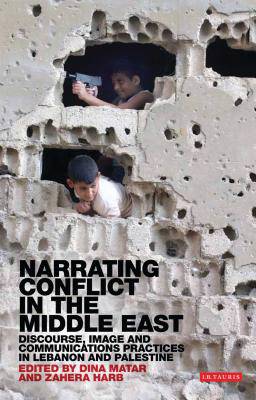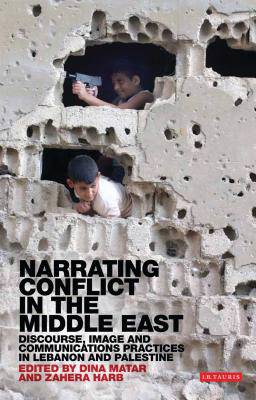
- Afhalen na 1 uur in een winkel met voorraad
- Gratis thuislevering in België vanaf € 30
- Ruim aanbod met 7 miljoen producten
- Afhalen na 1 uur in een winkel met voorraad
- Gratis thuislevering in België vanaf € 30
- Ruim aanbod met 7 miljoen producten
Zoeken
Narrating Conflict in the Middle East
Discourse, Image and Communications Practices in Lebanon and Palestine
Dina Matar, Zahera Harb
€ 34,95
+ 69 punten
Omschrijving
The term 'conflict' has often been used broadly and uncritically to talk about diverse situations ranging from street protests to war, though the many factors that give rise to any conflict and its continuation over a period of time vary greatly. The starting point of this innovative book is that to consider conflict within a singular concept disables a coherent analysis of the constituent factors behind any particular conflict. At the same time, to consider each conflict as entirely distinct and unique undermines an attempt to examine common factors in all conflicts. The contributors set out to explore alternative ways in which the long-term conflicts in Palestine and Lebanon have been and are narrated, imagined and remembered in diverse spaces, including that of the media. They examine discourses and representations of the conflicts as well as practices of memory and performance in narratives of suffering and conflict, all of which suggest an embodied investment in narrating or communicating conflict. In so doing, they engage with local, global and regional realities in Lebanon and Palestine and they respond dynamically to these realities.
Specificaties
Betrokkenen
- Auteur(s):
- Uitgeverij:
Inhoud
- Aantal bladzijden:
- 288
- Taal:
- Engels
- Reeks:
Eigenschappen
- Productcode (EAN):
- 9781780761039
- Verschijningsdatum:
- 25/07/2013
- Uitvoering:
- Paperback
- Formaat:
- Trade paperback (VS)
- Afmetingen:
- 150 mm x 212 mm
- Gewicht:
- 376 g

Alleen bij Standaard Boekhandel
+ 69 punten op je klantenkaart van Standaard Boekhandel
Beoordelingen
We publiceren alleen reviews die voldoen aan de voorwaarden voor reviews. Bekijk onze voorwaarden voor reviews.











